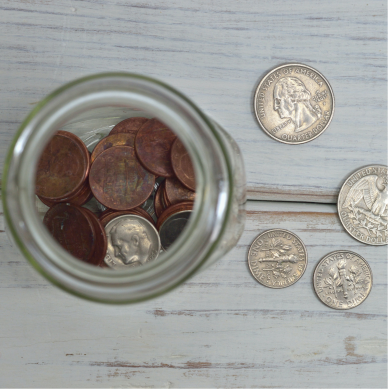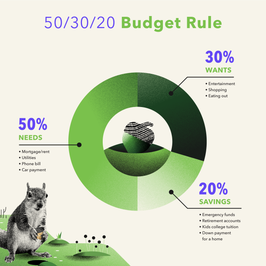15 Money Saving Tips

Building an emergency fund and saving money can be key to staying out of debt, but finding the extra cash to get started can be difficult. Here are 15 money saving tips that can help you:
1. Include saving in your budget
The first step in saving money is to prioritize saving when creating a budget. No matter what your goals are, setting aside a portion of your income for your future goals is a critical part of improving your finances.
A good guideline is the 50/30/20 budgeting rule.
-
50% of your income goes toward your needs and essential expenses, like housing
-
30% of your income goes toward wants, such as entertainment or travel
-
20% of your income goes toward savings, including your emergency fund and retirement accounts
Budgeting apps like You Need a Budget and Mint can help you get started.
2. Pay down debt
When you pay down your debt, you can save a substantial amount of money in interest. And once you eliminate your loans or credit card balances, you can use that money toward your other goals, like saving for a down payment on a house.
To pay down debt, pay more the minimum amount required. Even an extra $5 or $10 can make a difference over time. And if you target the debt with highest interest rates first, you can save even more.
3. Cancel unnecessary service, subscriptions, or memberships
Companies make it easy to sign up for recurring subscriptions and services. You may not even realize how many memberships you have, and all of those little charges can add up.
Review your credit card and bank statements every month and look for any subscriptions or recurring charges for services that you don’t use, such as apps or streaming services. By canceling even just a couple of them, you could free up more cash for your other goals.
4. Buy store brand groceries
When you’re on a budget, buying store brand foods rather than name brands is a small but effective way to save money and stretch your dollars further. The store brands are often just as tasty as the name brand, but are much less expensive.
5. Invest spare change
If you’re finding it difficult to find extra money to set aside, taking advantage of Acorns’ Round-Ups® feature could be a powerful solution. When you open an Acorns investment account and link your bank accounts and credit cards, Acorns will round up your purchases to the nearest full dollar and deposit the difference into your investment account.
Once it accrues at least $5, it will invest that amount in an ETF portfolio for you. Although investing has more risk than a savings account, your spare change has the chance to grow over time.
6. Shop your own pantry
A good way to trim your food budget — and force yourself to expand your cooking skills — is to have nights where you cook a meal using only what’s already in your pantry.
This strategy causes you to use ingredients you may not often use, and because you’re cooking with ingredients you already own, requires no additional spending.
For example, you can make a tasty stew or soup with noodles, broth and beans. Or you can whip up brownies with the peanut butter and chocolate chips at the bottom of the pantry.
To get ideas, use SuperCook’s zero waste recipe tool. You just enter what ingredients you have on hand, and it gives you a list of recipes you can make.
7. Eat Out Less
When you’re working or caring for children or other dependents, the last thing you want to do is cook dinner at the end of a long day. But while takeout or delivery is convenient, it can be expensive.
You can save a significant amount of money by meal planning and batch cooking. If you cook everything ahead, all you have to do is heat up the meals when you’re hungry.
Batch cooking can be overwhelming at first. But you can find excellent recipes and guides on Pinterest, and Bon Appétit has a list of 97 recipes you can prep and freeze to eat well all week.
8. Take a no-shopping challenge
With online shopping and same-day delivery, it’s all too easy to make impulse purchases and fritter away cash. And those small purchases — a lipstick there, a few packs of gum there — can add up.
Curb your spending by setting a no-spend challenge for yourself. Besides critical essentials like groceries or toilet paper, allow no purchases at all.
No-spend challenges can range from a week to a month or more, so pick a duration that will be difficult, but not impossible, so you can realistically achieve your goals.
9. Look for buried treasure in your own home
You may be surprised by how valuable some of your unused belongings are. Whether you have Legos from your childhood, old Disney VHS tapes, or a vintage Pyrex set, you can turn those items into cash by selling them online on eBay or Mercari.
Look for similar items and adjust the filter settings to show sold items so you know how much to expect for your things.
10. Shop wisely
Where you shop can have a big impact on your total. For example, it may be convenient to pick up paper towels or laundry detergent at the local drugstore or grocery store, but it's much more expensive than a big box retailer like Walmart or Target. Plan your shopping trips ahead so you can figure out where to stop for the best deals.
11. Look for dupes of expensive favorites
Being frugal doesn’t mean you have to sacrifice the things you love. However, you may be able to find cheaper substitutes that work just as well.
Beauty and skincare are excellent examples. Drugstore products have come a long way in quality, and it’s possible to find similar items that are nearly identical — known as “dupes” — to expensive products for a fraction of the price.
DupeDrop is a great tool you can use to find dupes of your favorite products. Just enter the brand and product name, and the tool will give you a list of similar products at various price points.
12. Use free fitness apps
Gym memberships can cost anywhere from $10 to $100 per month. But if you have a smartphone or another device, you can use free fitness apps to get an effective workout and save money.
Apps like MyFitnessPal and YouTube have tons of free workouts you can use to stay in shape and improve your health.
13. Take advantage of buy nothing groups
Buy nothing groups are excellent resources when you’re trying to save money and prevent unnecessary purchases. With these groups, you post a request for items you’re looking for, like pots and pans or a bike for a child. If someone in the group has the item you’re looking for, you can connect and get that item for free. It keeps people from buying things unnecessarily, and helps neighbors reduce clutter.
You can find community buy nothing groups on social media, or you can download the Buy Nothing Project app.
14. Sign up for loyalty programs
Many stores, restaurants and coffee shops have loyalty programs. If you frequently shop at certain locations, you could qualify for coupon codes or discount programs that can help you save money on your regular purchases.
15. Open a high-yield savings account
Rather than stashing money in a checking account or basic savings account, open a high-yield savings account. High-yield accounts offer higher annual percentage yields (APYs) than standard accounts, so your money can grow faster.
The views expressed are generalized and may not be appropriate for all investors. Investing involves risk, including the loss of principal. Carefully consider your financial situation, including investment objective, time horizon, risk tolerance, and fees prior to making any investment decisions.








